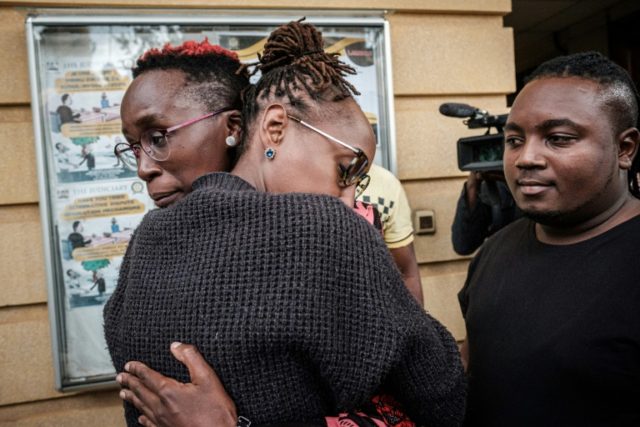Nairobi (AFP) – Kenya’s high court refused to scrap laws criminalising gay sex on Friday, in a blow to the LGBT community that was criticised by rights groups and the UN as a major step backwards for equality in the east African powerhouse.
Gay rights organisations had hoped Kenya would follow a global trend toward easing legal restrictions on homosexuality, with landmark legal decisions seen in India and Taiwan, while three African nations have recently overturned anti-gay laws.
But three years after they filed their petition, the high court ruled that laws criminalising homosexuality were not unconstitutional, leaning heavily on concerns about culture and family values in Kenya, a deeply Christian country.
“We find the impugned sections (of the penal code) are not unconstitutional. We hereby decline the relief sought and dismiss the consolidated petition,” said Roselyne Aburili, presiding over a three-judge bench.
Inside the packed courtroom, gay couples held hands and waved rainbow flags as the lengthy judgement was read out, while a bishop sat clutching a bible in the front row.
After the ruling, the couples embraced and wiped away tears, and others wrapped themselves in flags.
“We have to fight for our rights. This is who we are,” said Jordan Zeus, a gay Ugandan man who escaped persecution there to seek refuge in Kenya, urging activists to keep fighting.
In a remark prompting gasps, Aburili said that evidence presented in court provided “no conclusive scientific proof that LGBTQ people are born that way”.
Campaigners had asked the court to scrap two sections of the penal code that criminalise homosexuality.
One section states that anyone who has “carnal knowledge… against the order of nature” can be imprisoned for 14 years.
Another provides for a five-year jail term for “indecent practices between males”.
While convictions under the decades-old laws are rare, gay activists say the legislation infringes on their privacy and dignity, foments discrimination and blocks access to healthcare and justice.
The court dismissed all of these arguments, saying the petitioners failed to provide sufficient evidence.
Aburili said that while rulings scrapping such laws around the world were “persuasive, they are not binding on this court”.
– ‘Step backward’ –
A coalition of gay rights groups issued a statement expressing their “great distress” at the ruling, saying it “justifies the stigma, discrimination and violence meted against Kenyans” in the LGBT community.
Human Rights Watch said the decision was “a step backward in the progress Kenya has made toward equality in recent years.”
“Kenya’s High Court has relegated people in same-sex relationships in Kenya to second-class citizenship, based on the absurd claim that the penal code is not discriminatory,” said Neela Ghoshal, the watchdog’s senior LGBT rights researcher.
The judges leaned heavily on section 45.2 of the constitution, which states that “every adult has the right to marry a person of the opposite sex.”
Aburili said it did not matter that the petitioners were not seeking the right to same-sex marriage, as decriminalisation would lead to “same-sex persons living together as couples” and would contradict the constitution.
United Nations rights chief Michelle Bachelet urged LGBT activists and their allies to keep fighting for equality.
“Criminalizing acts targeting certain individuals based on who they are and whom they love is inherently discriminatory. It also sends a dangerous signal to broader society and encourages hostility and even violence against LGBT individuals,” Bachelet said in a statement.
The United Nations AIDS agency said it “deeply regrets” the decision, as “a missed opportunity for Kenya to uphold human rights and to restore privacy, respect and dignity” to the LGBT community.
Outside the court, a Christian group sang choir songs and held aloft banners declaring “God forbids it and we say no!” as dejected members of the LGBT community streamed past.
Kenya’s leaders, like many in Africa, deride homosexuality as a western import that goes against local culture.
Campaigners were upbeat that the decision would go in their favour, after the same court in March last year banned forced anal testing of men suspected of being gay.
And in September a court ruled that “Rafiki” (‘Friend’),a film about a lesbian love affair which was the first Kenyan movie to be shown at the Cannes film festival, could be screened domestically for seven days after its initial banning.
– ‘Kenyans are happy’ –
Charles Kanjama, a lawyer for the Kenyan Christian Professionals Forum, which opposed the petition, welcomed the ruling.
“The people of Kenya are happy that the courts have not been misused to try and introduce laws that the majority of Kenyans and their institutions are opposed to.”
Activists believed Kenya had a chance to blaze a trail in Africa where homophobia is virulent in many communities.
Twenty-eight out of 49 countries in sub-Saharan Africa have laws penalising same-sex relationships, according to Ghoshal.
Angola, Mozambique and Seychelles have scrapped anti-gay laws in recent years.
On the other hand, Chad and Uganda have introduced or toughened legislation.
np-fb/ri

COMMENTS
Please let us know if you're having issues with commenting.